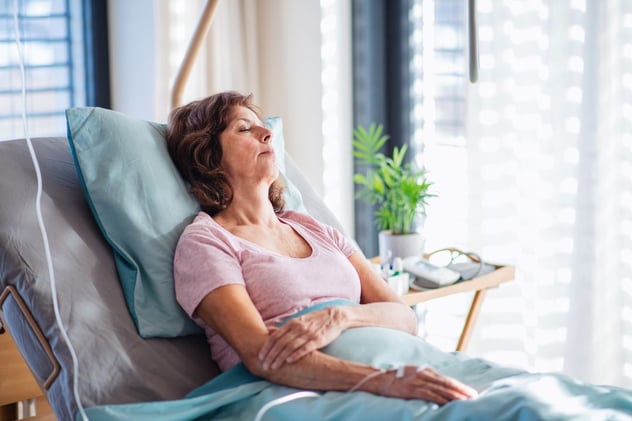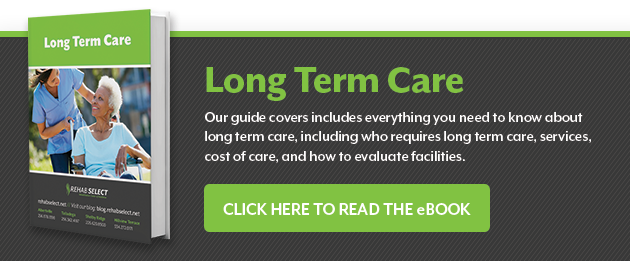
Dehydration is worryingly common in the senior population and can have serious consequences. Studies show that up to 40% of community-dwelling senior citizens may be chronically underhydrated. Seniors are at far greater risk of dehydration, and it can be hard for doctors to diagnose, meaning that the condition may go untreated.
We’ve highlighted the reasons why dehydration is so common in older adults, how to spot the symptoms, and how an IV drip for dehydration can help treat this serious condition quickly and effectively.
Why is Dehydration an Issue for Seniors?
If your body is losing more water than you are taking in, the condition is called dehydration. What’s more, if your body doesn’t have enough fluid to carry out its normal functions, you may become seriously ill. In general, the symptoms of dehydration become noticeable after 2% of your body fluids have been lost.
Commonly, elderly people are more prone to this issue, so it’s important to watch for signs of dehydration in seniors. As the body ages, it naturally stores less water. Aging also causes a weaker thirst response, meaning that you may not be aware that you’re thirsty until you are already dehydrated. In addition, kidney function decreases with age, meaning that seniors tend to lose more water in urine.
As well as the natural process of aging, there are several other risk factors that may increase the chances of dehydration in seniors:
- Medications
Some commonly prescribed medications can cause side effects that could increase the risk of dehydration. For instance, some blood pressure medications may encourage the body to flush excess water, and other medications can trigger sweating, diarrhea, or increased urination.
- Limited Mobility
Elderly people who find it hard to move around may be reluctant to get up and get themselves a drink, or they may depend on caregivers to remember to bring them water.
- Cognitive Impairment
It may be hard for some seniors to remember to drink water or other fluids, especially given that their thirst response may not be strong enough to remind them.
- Health Conditions
Diabetes and kidney disease are prevalent in elderly populations. Both conditions can increase the risk of dehydration. Infections can also cause dehydration, especially when they cause a fever.
- Diet
We get a lot of our fluids from our diet. Some elderly people do not eat enough, or eat a very restricted diet, and may, therefore, not be taking in enough fluids from their food.
- Underdiagnosis
It can be hard for doctors to spot signs of dehydration in seniors, and so problems may continue to worsen over time. The clinical symptoms may only be obvious in the most severe phase. According to research published in the Journal of Geriatric Medicine and Gerontology, “Symptoms and signs caused by dehydration are often attributed, mistakenly, to other causes. In the absence of a validated hydration assessment tool, dehydration is often under diagnosed.”
Symptoms of Dehydration in Seniors
To prevent severe dehydration, it’s key to know the signs and symptoms. Mild and moderate dehydration can cause a range of different issues, including:
- Fatigue
- Dizziness or feelings of lightheadedness
- Dry mouth
- Sunken eyes
- Reduced urination
- Muscle cramps
- Darker urine
If dehydration is not promptly treated, more severe symptoms can develop. These may include:
- Trouble with walking and balance issues
- Dizzy spells and fainting
- Disorientation
- Diarrhea and vomiting
Elderly patients who experience prolonged or severe dehydration may develop additional complications, such as seizures, urinary tract infections (UTIs), kidney stones, kidney failure, and hypovolemic shock, which can be fatal.
It is crucial to note that physical symptoms are not always a viable way to diagnose dehydration in the elderly. These symptoms can be caused by many other conditions that are common in the senior population. One study conducted across 56 care homes found that, while 20% of residents were dehydrated, none of the commonly used diagnostic signs were useful at discriminating between those with dehydration and those without.
The quickest way to check for dehydration is to simply offer senior patients fluids and see if they recover. However, for a full medical diagnosis, a laboratory blood test may be necessary, as well as a physical examination.
When Is an IV Drip for Dehydration Recommended?
For patients with mild or moderate dehydration, usually increasing their oral intake of fluids will be enough to help them recover. However, in some cases, an IV drip for hydration will be necessary. An IV drip may be recommended for:
- Severe dehydration
Because IV drips allow fluids to bypass the digestive system, they work much more quickly than taking in fluids by mouth. As a result, they are the ideal treatment for very severe dehydration, which is considered a medical emergency.
- Patients who are unable to drink
Some patients may not be able to sit up and drink, either because they are physically too weak, are unable to sit, or have issues with swallowing. For these patients, treatment with an IV is the best solution. In some cases, patients who cannot take in fluids or food by mouth may be placed on total parenteral nutrition (TPN), where both fluids and nutrients are provided by IV.
How do IV Drips for Hydration Help Seniors?
IV drips for dehydration can be a fast-acting and effective treatment for seniors. Addressing dehydration can have a major impact on patient well-being:
- Improving dehydration can help speed recovery.
Dehydration is very debilitating. The body requires ample fluid reserves to recover from illness and restore normal functions. If fluids have been lost due to infection or illness, then addressing the dehydration can help speed patient recovery. IV drips can help restore healthy levels of hydration more quickly and efficiently than taking in fluids by mouth.
- Staying hydrated can have major health benefits for seniors.
Hydration is involved in most bodily functions and is critical for physical well-being. Healthy hydration levels will improve digestive health, reduce the risk of constipation, reduce the risk of coronary heart disease, minimize the risks of falling, and much more. Hydration may even reduce the risk of colorectal cancer and, in men, bladder cancer.
IV fluids for dehydration in adults can be a key part of recovery for those in skilled nursing and short- and long-term rehabilitation centers. At Rehab Select, we offer IV therapy with round-the-clock RN coverage to treat a variety of conditions, including dehydration, immune deficiencies, infection, and pain. To find out more about our services, please visit our website or click here to contact us.





